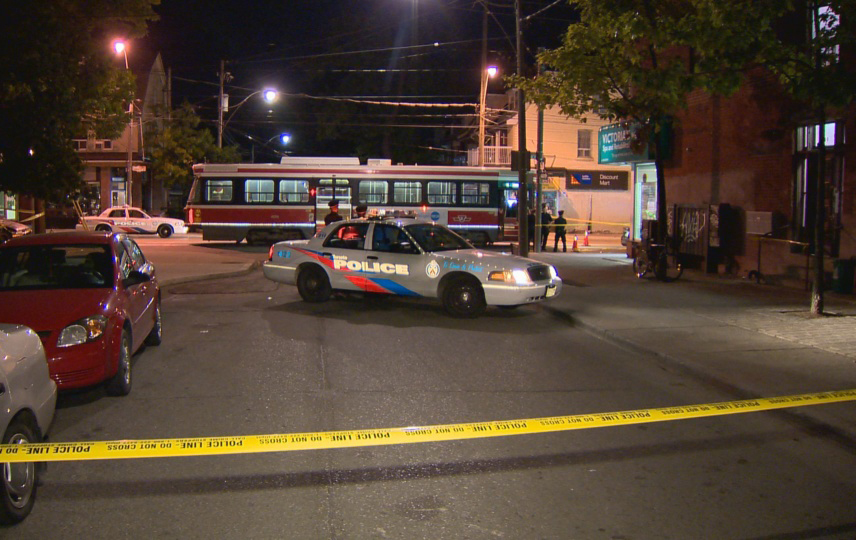TORONTO – It’s a national conversation that’s finally taking place.

Amid growing concern over how police deal with some of society’s most vulnerable, law enforcement officials, those who live with mental illness and the people who support them have gathered to discuss what can be done to avert tragedies involving those in crisis.
That dialogue – deemed the first of its kind – comes at a time when statistics suggest one in five Canadians experience a mental health illness in any given year.
“It’s major step forward and a very bold step forward,” said Louise Bradley, CEO of the Mental Health Commission of Canada, which is hosting the conference in Toronto with the Canadian Association of Chiefs of Police.
One of the key issues police and mental health advocates have to grapple with is the lack of national standards – there isn’t a country-wide training curriculum for officers on how to deal with the mentally ill, nor is there comprehensive data collected on the issue.
READ MORE: Jury recommends de-escalation in police confrontations with the mentally ill
Certain police forces have been singled out as “pockets of excellence,” while others lag behind, but across the country there’s a consensus that police are increasingly on the front lines of mental health care.
“Some areas in the country are handling the issue differently and perhaps better than others,” said Bradley. “That’s the whole purpose of this conference – to learn about that and to be able to share that information that’s critically important.”
- Raptors 905 open tryout sets tone for entire organization as Raptors continue rebuild
- Largest school board in Ontario under fire after field trip to downtown protest
- Michael Ford announces temporary departure from role as Ontario cabinet minister
- Activists call for Boogie the monkey to be removed from Ontario roadside zoo
The few figures available emphasize the need for a collaborative discussion – in Toronto police get 20,000 calls a year directly related to mental health issues while police in Vancouver say mental illness was a factor in 21 per cent of their calls last year.

Get weekly health news
Although the majority of those calls end peacefully, the handful that result in the death of a person in crisis has led to accusations of excessive police brutality.
One such instance was the case of Toronto teenager Sammy Yatim, who was shot multiple times while apparently wielding a knife on an empty streetcar. Another was the death of Michael Eligon, who died on a residential street after approaching officers with two pairs of scissors while wearing only a hospital gown and socks.
For Vancouver Police Chief Jim Chu, who is also the president of the Canadian Association of Chiefs of Police, altering the public’s perception of how officers deal with those in crisis is part of dealing with the issue.
“I know the public is concerned about the harm that can come to a loved one or friend who is afflicted with a mental illness,” he said. “Police want the person with the mental illness and also bystanders to be safe. And the police will, as professionally and diligently as possible, try to de-escalate confrontations and use force only as a last resort.”
The very nature of policing has changed over the last few years as apprehension under the Mental Health Act skyrocket, Chu said.
“One of the things I used to say was that police were the mental health response agency of last resort. The police are increasingly becoming the mental health response agency of first resort,” he said.
“With this new policing responsibility goes a mindset change that we need to engage in.”
The three-day meeting where that change in thinking is being discussed has drawn 320 participants to Toronto and is set to wrap up Wednesday afternoon.
A primary goal at the conference is information sharing to find out what works well and confront what doesn’t. The Mental Health Commission plans to keep that dialogue going by gathering information in a common space which can be accessed by police agencies and mental health workers across the country.
Another key issue the conference hopes to make progress on is the collection of hard figures to track and measure interactions between police and the mentally ill.
“Because it’s occupying so much police time we need to capture it better and in a more consistent standardized way across Canada,” said Chu, adding that statistics would help police forces argue for additional resources and useful partnerships.
“What gets measured gets worked on.”
Chu also welcomed more scrutiny of policing agencies.
“I’m not sure that there’s any more accountable profession these days than policing,” he said, pointing to coroner’s inquests, the criminal and civil courts and police watchdogs as venues where officers’ actions are reviewed time and again.
“If people want more oversight than that, I say bring it on.”







Comments